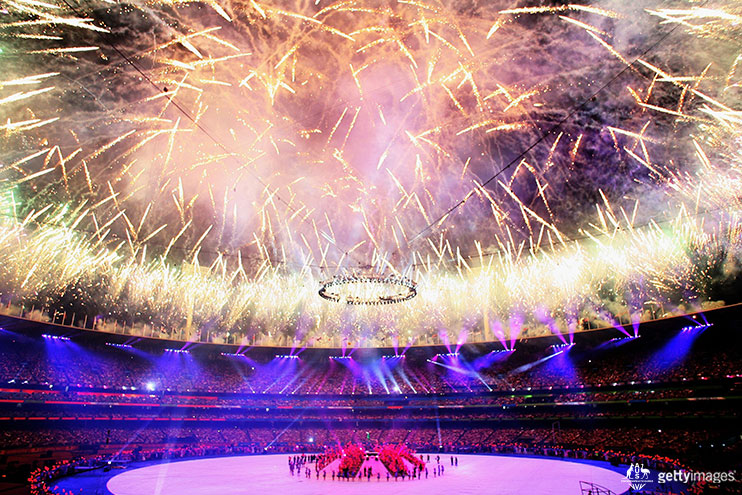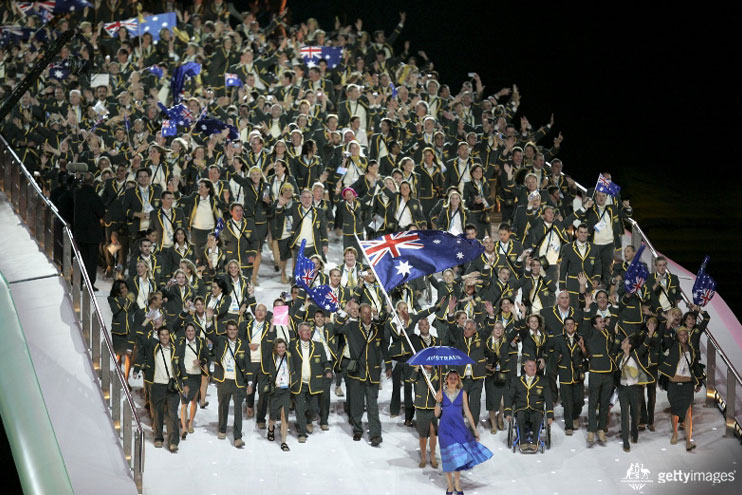
On the 15-year anniversary of the Closing Ceremony of the Melbourne 2006 Commonwealth Games, we reflect on the significant moment in Australia’s sporting history.
The Melbourne 2006 Commonwealth Games, officially the XVIII Commonwealth Games, was held between 15 and 26 March 2006.
It was the fourth time Australia had hosted the Commonwealth Games, joining Sydney in 1938, Perth in 1962, and Brisbane in 1982. The Gold Coast became the fifth Australian host city with the Games in 2018.
During the Kuala Lumpur 1998 Commonwealth Games, the Commonwealth Games Federation received submissions from two cities interested in hosting the 2006 Games; Wellington, New Zealand and Melbourne, Australia.
Wellington withdrew its bid citing the costs involved in hosting the Games against the bid put forward by the Melbourne team, leaving Australia’s self-proclaimed’ home of sport as the sole city in the running and the unanimous choice for the 2006 Commonwealth Games.
Melbourne 2006 became the largest sporting event to be staged in the city, eclipsing the 1956 Summer Olympics in terms of the number of teams competing, athletes competing, and events being held.
More than 4,000 athletes from 71 Commonwealth Games Associations took part in the event and with 245 sets of medals on offer from 17 sports, it was the largest Commonwealth Games in history to that point.
The sporting events took place at 13 venues around the metropolitan city, but also took the Games to Victorian regional centres, with events being held at two venues in Bendigo and one venue each in Ballarat, Geelong, Lysterfield Park and Traralgon.
The site for the opening and closing ceremonies was the Melbourne Cricket Ground (MCG) which was also used as the centrepiece of the 1956 Summer Olympics.
In a celebration of the city, the Opening Ceremony will be remembered by many for the sight of a tram flying high above the MCG, as the 800kg icon of Melbourne descended from the sky to take its place on centre stage.
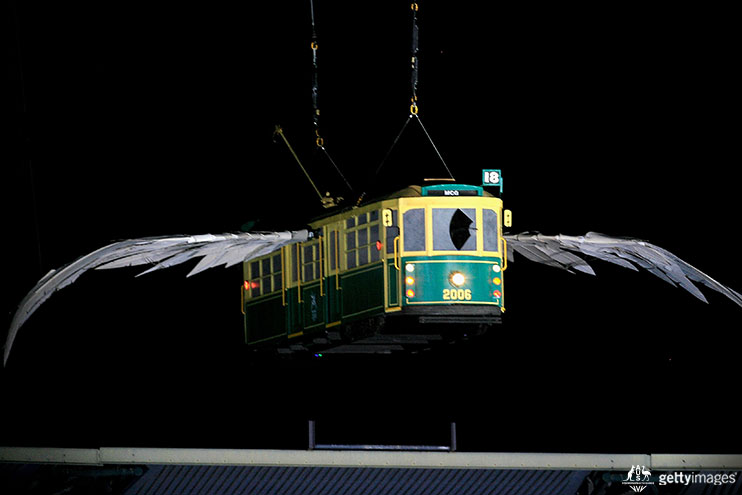
The W-class tram descended from the sky at the Opening Ceremony. (CGA Archive / Getty Images)
The official song of the games, “Together We Are One”, was composed by the ARIA award-winning Australian recording artist Delta Goodrem, who performed the anthem surrounded by a fireworks-filled carnival atmosphere of colour, excitement and passion.
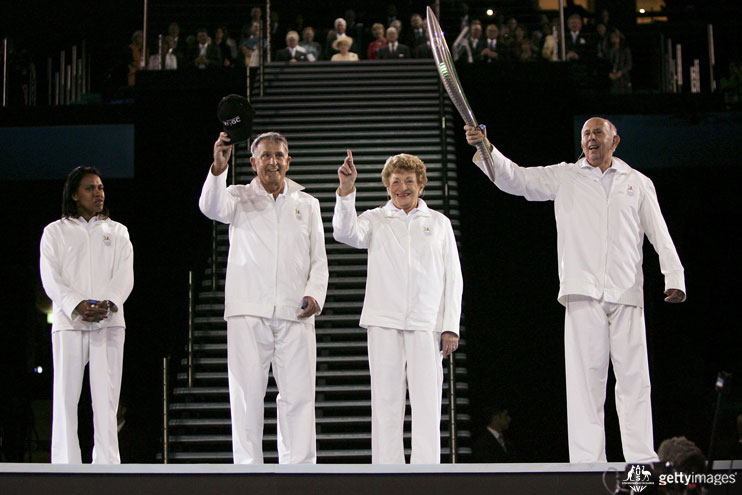
Australian sport royalty (L-R: Cathy Freeman, Ron Clarke, Marjorie Jackson-Nelson and John Landy) at the Opening Ceremony. (CGA Archive / Getty Images)
Australia fielded a team of 417 athletes at the Games and were led out by then two-time gold medallist Jane Saville.
The champion racewalker remembers the call she received asking her to attend the Australian Team Reception at the Melbourne Town Hall.
Games officials had to twist her arm to get the four-time Commonwealth Games representative to even attend the function where they were going to announce the Australian flag bearer for the Opening Ceremony.
“I had just arrived home from Europe and I was tired, and I don’t cope well without sleep, so I thought it’s just best if I don’t go,” Saville recalled.
“There’s no way in the world I’m going to (get the nod) to carry the flag I thought to myself.
“But I did go and when I was down there, I got an inkling of what might be happening after they positioned me in one part of the Town Hall.
The hunch proved correct, and Saville was chosen as the flag bearer, becoming just the third female athlete to lead the team out at the Opening Ceremony, joining athletics legend Pam Kilborn-Ryan AM MBE (Edinburgh 1970) and swimming star Lisa Curry AO MBE (Auckland 1990)
“It is difficult to describe that feeling of having the whole team supporting you, everyone is on this high, everyone is happy and with tens of thousands of people cheering for you and you are in the Australian uniform… I don’t think you could feel any prouder at any time in your life.”
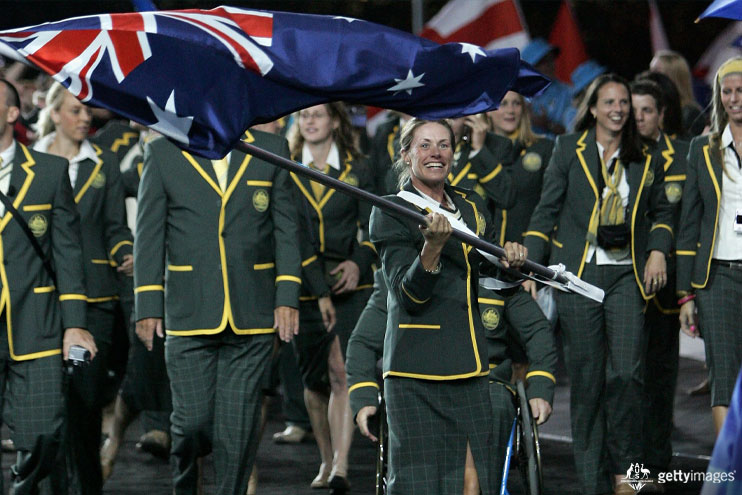
Jane Saville leading the team out at the Opening Ceremony. (CGA Archive / Getty Images)
Days later Saville would win gold in the women’s 20km walk, her third straight victory in the event, finishing ahead of sister Natalie Saville.
As the Opening Ceremony concluded, it began 11 days of competition as the best athletes in the Commonwealth took the stage.
Melbourne 2006 proved to be a golden Games for Australia, as the home nation had its most successful Commonwealth Games ever, winning 84 gold among its haul of 221 medals, a record that still stands today.
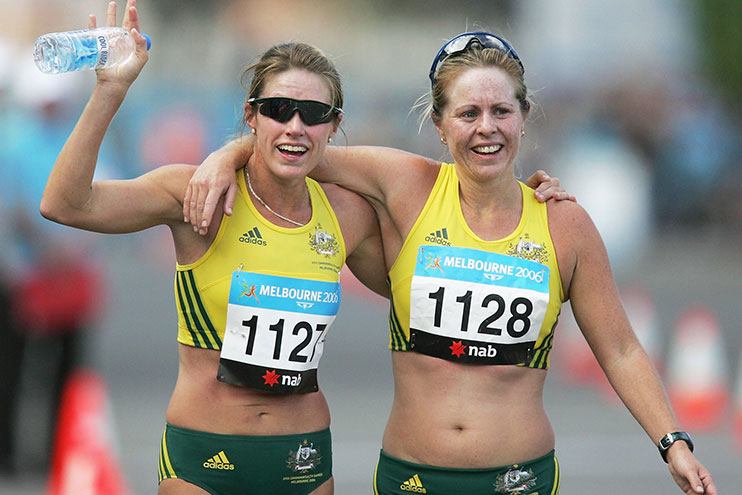
Greater Together: Medal winning Saville sisters walk down memory lane to Melbourne 2006
It’s a sister act that started with tantrum tears at Sydney’s Hensley Field back in 1980 and ended in tears of joy 26 years later at the Melbourne 2006 Commonwealth Games. Ian Hanson catches up with racewalking champion sisters Jane and Natalie Saville.
READ MOREBasketball made its Commonwealth Games debut in Melbourne, with the Australian Opals and Boomers dominating the hardwood en route to a pair of gold medals. The Opals were powered by Sport Australia hall of famer Lauren Jackson, then WNBA but now AFLW star Erin Phillips, and a young Belinda Snell who joined then Boomers youngster Brad Newley in returning to compete at the Gold Coast 2018 Games, becoming the only two-time basketball gold medallists in Commonwealth Games history.
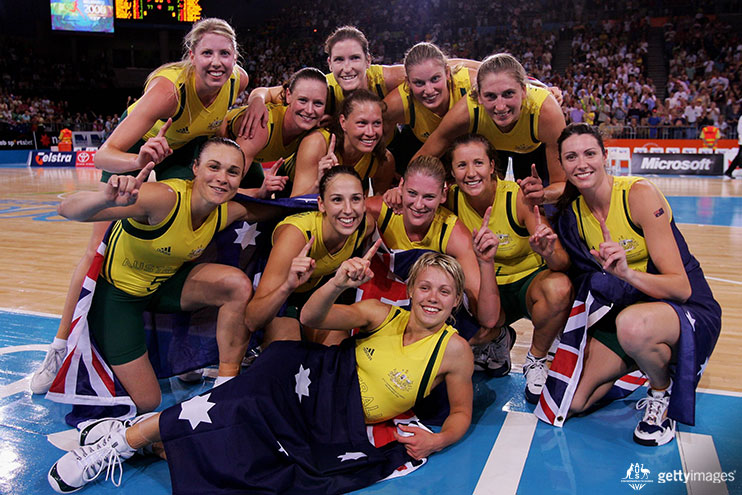
The Australian Opals dominated the hardwood to win the gold medal in Melbourne. (CGA Archive / Getty Images)
Inside the squared circle, middleweight Jarrod Fletcher and heavyweight Brad Pitt won Australia’s two boxing gold medals; while our Badminton players competed valiantly on the courts, with a team that featured Kate Wilson-Smith who was competing in her third Games. Wilson-Smith went on to win bronze in the women’s doubles with He Tian Tang at the Delhi 2010 Commonwealth Games.
It was a case of sister act for the Australian cyclists with sisters Kate Bates and Natalie Bates each winning gold medals, Kate defending her gold medal from the Manchester 2002 Commonwealth Games by winning the women’s points race and Natalie winning gold in the women’s road race. While sisters Anna Meares OAM and Kerrie Meares finished with gold and bronze in the women’s 500m time trial, it was Anna’s first Commonwealth Games gold medal, with the cycling legend going on to win four more in her illustrious career.
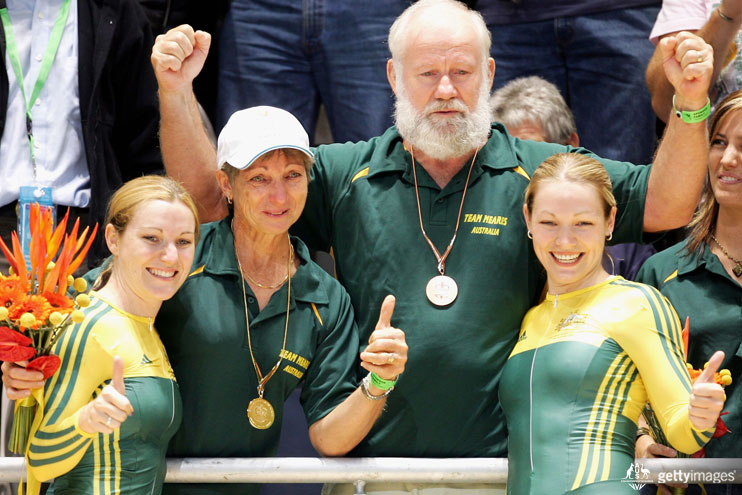
The Meares sisters celebrate with their parents after winning gold and bronze in the 500m time trial. (CGA Archive / Getty Images)
Ryan Bayley OAM was another star of the velodrome winning gold medals in the men’s sprint and keirin events, adding a bronze medal in the men’s team sprint. While Mathew Hayman won gold on the Melbourne roads in the road race.
It was back-to-back gold medals for our Hockeyroos with the women’s national side defeating the Indian side 1-0 in front of a raucous crowd at the State Netball Hockey Centre, while the Kookaburras made it three straight gold medals with a dominant tournament capped off with a 3-0 victory over Pakistan in the gold medal match.
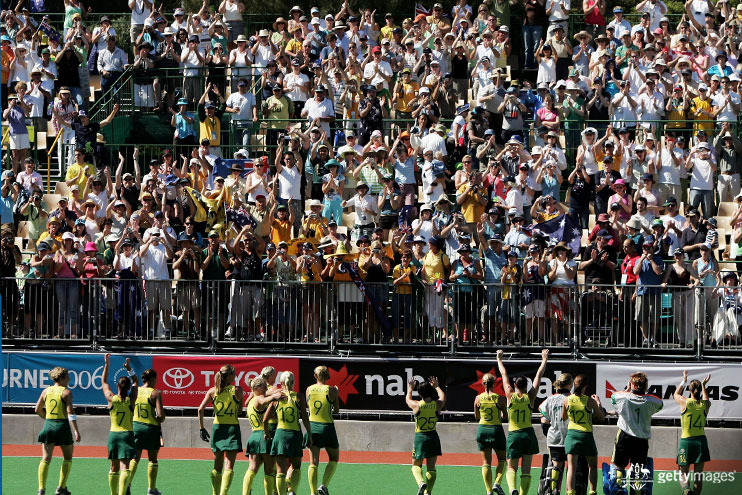
The Hockeyroos won gold in front of a capacity crowd. (CGA Archive / Getty Images)
The 2006 Games were remembered for the celebrations, especially the celebrations on the greens by Australia’s lawn bowlers!
Melbourne was the Jackaroos best performance to date, winning three gold medals, a silver and a bronze. It began with the men’s triples team of Bill Cornehls, Wayne Turley and Mark Casey whose hairstyles had as much flare as their gold medal winning performance, the trio’s infamous hairstyles featured a little bit of yellow and a little bit of green.
Gold in the women’s pairs was delivered by the hands of Karen Murphy AM and Lynsey Clarke (nee Armitage) in an exciting final against Scotland’s Kay Moran and Joyce Lindores, the duo were lifted up on their teammates shoulders after the final bowl had been delivered, saluting their family, friends and fans in the crowd.
Murphy recalls there is nothing like the feeling of playing a home games.
“Winning a gold medal in front of your family and friends is the ultimate in sport,” said Australia’s most capped international bowler.
“There is no feeling l like it, it was the pinnacle of my career.”
The most iconic celebration came from an inside joke and bet between teammates, when one of Australia’s most decorated bowlers Kelvin Kerkow won a remarkable victory in the coveted men’s singles event.
“I said to Barrie [Lester] that if I win a gold medal at the Commonwealth Games I’ll go further than just a lift of the shirt, I’ll rip the whole thing off,” Kerkow recalled.
“I hadn’t given my rash statement anymore thought until that exact moment when so much relief and joy came over me after winning gold, and off it went.”
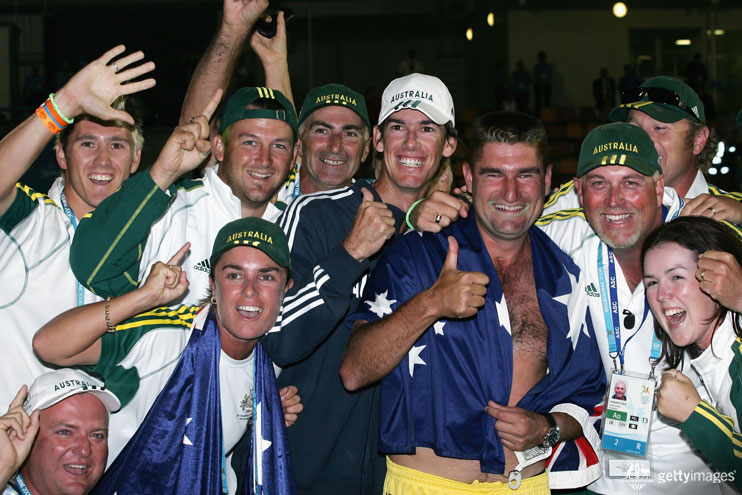
The Jackaroos celebrate Kelvin Kerkow’s victory in the men’s singles. (CGA Archive / Getty Images)
While it was celebration for the Jackaroos on the greens, it was heartbreak on the court for the Diamonds as the national netball team went down to archrivals New Zealand 55-59 in the gold medal match, putting a silver lining on the career of three-time representative and three-time medallist Janine Ilitch who retired after the Games.
For our strong men and women it was a great games, Darren Gardiner won bronze in the men’s Para-powerlifting open category, while weightlifters Alex Karapetyan (men’s 94kg), Chris Rae (men’s 105kg+) and Ben Turner (men’s 69kg) all won gold medals. While Deborah Acason (nee Lovely) broke through for gold in the women’s 75kg category after winning silver at the Manchester 2002 Commonwealth Games.
Rhythmic gymnasts Naazmi Johnston, Kimberly Mason and Amanda Lee See won bronze in the women’s team all around, while their artistic teammates of Ashleigh Brennan, Hollie Dykes, Naomi Russell, Monette Russo and Chloe Sims won gold in the women’s team event, with Damian Istria, Joshua Jefferis, Samuel Offord, Philippe Rizzo and Prashanth Sellathurai winning silver in the men’s team all around.
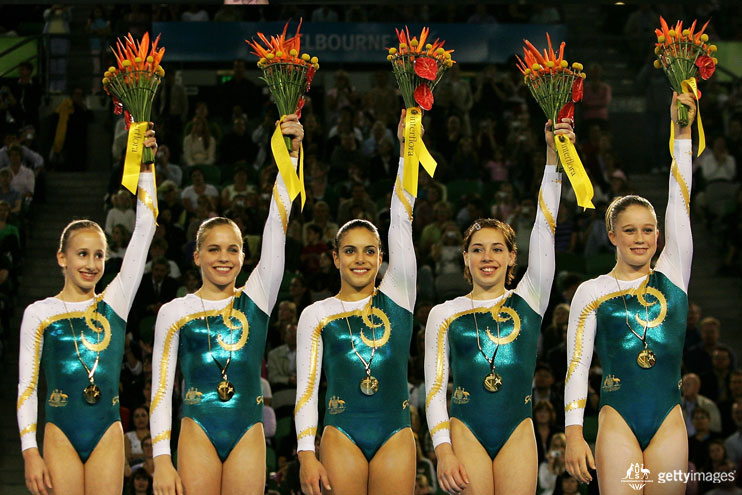
Australian gymnasts won gold in the women’s team all-around competition. (CGA Archive / Getty Images)
Our Australian rugby 7s side narrowly missed out on the medals, losing 17-24 to Fiji in the bronze medal match, the side featured then Wallabies star Lote Tuqiri in his sole Commonwealth Games appearance.
It was a Games to remember for squash star Natalie Grinham, in a golden sweep the Squash Australia star defeated sister Rachael Grinham for gold in the women’s singles, before going on to team with her sister to win gold in the women’s doubles, and then pairing with Joe Kneipp to win her third gold medal in the mixed doubles. Squash legend David Palmer OAM won silver in the men’s singles, going one better than his bronze medal finish in Manchester, Palmer would have his golden break through at the Glasgow 2014 Games winning two gold medals.
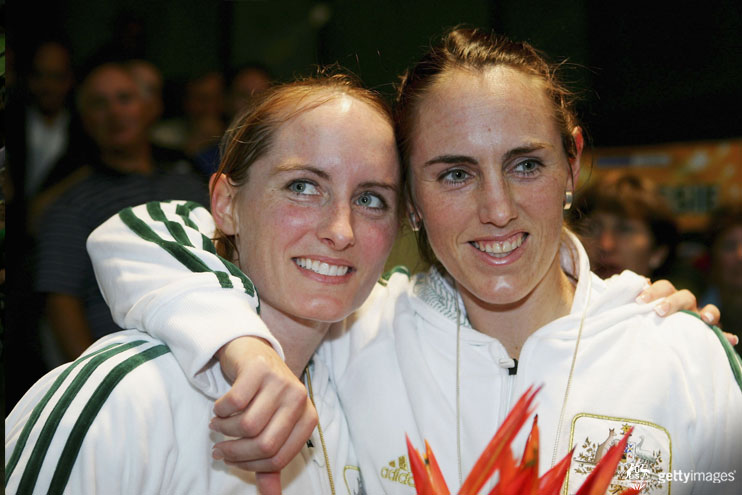
Sisters Natalie and Rachael Grinham won gold in the women’s doubles in Squash. (CGA Archive / Getty Images)
Irena Olevsky and Dannielle Liesch paired to win silver in the artistic swimming duet event, with Irena adding to the bronze she won in the solo event. William Henzell became the first medallist in men’s table tennis when he won silver in the singles event, while Peri Campbell-Innes, May Cho, Jian Fang Lay, Miao Miao and Stephanie Sang won silver in the women’s team event, the second straight Games silver medal finish for the national team.
Emma Snowsill and Brad Kahlefeldt won Australia’s first triathlon gold medals at the Commonwealth Games, when they won the women’s and men’s events. Our Australian shooters had medals in their sights, winning 21 total medals, including nine golds, including three golds for Lalita Yauhleuskaya, while Michael Diamond and Adam Vella made it back-to-back gold medals in the men’s trap pairs after winning the event in Manchester four years earlier.
The age-old battle for the top of the diving tower between Australia and Canada continued at the Games. One of the two nations had finished atop of the Diving medal tally at 12 of the previous 17 Commonwealth Games, with Australia getting the upper hand in Melbourne. In thanks, to Mathew Helm and Loudy Wiggins (nee Tourky) each winning two gold medals.
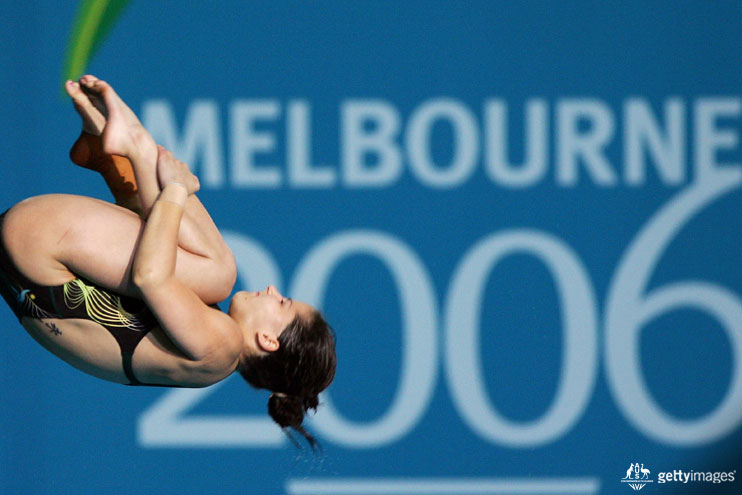
Australian divers finished atop of the tally with 15 medals including five golds. (CGA Archive / Getty Images)
Australian swimmers dominated the pool winning an incredible 54 medals including 19 golds. At the peak of her swimming powers Libby Trickett (nee Lenton) had one of the greatest Games in Commonwealth history winning seven medals, including five gold medals, in her sole Commonwealth Games appearance. Sport Australia hall of fame member Matthew Cowdrey OAM continued to add to his burgeoning career at the Games winning two gold medals in Para-swimming events.
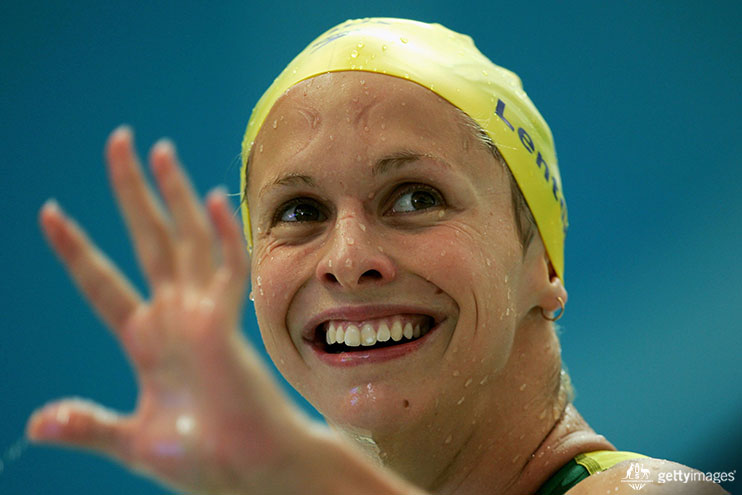
Libby Trickett was the star of the pool with seven medals, including five golds. (CGA Archive / Getty Images)
The MCG proved to be a happy place for our athletics stars with the team members winning 41 medals, including 16 gold medals. Elizabeth McIntosh finished ahead of teammate Katrina Webb OAM to win gold in the women’s 100m T37 event, while Bronwyn Thompson set a Games record by leaping to gold in the women’s long jump, and racewalker Nathan Deakes won dual golds in the men’s 20km and 50km events.
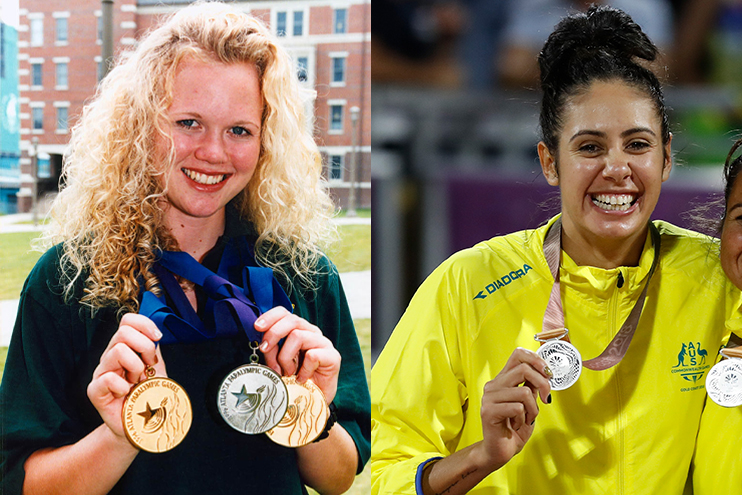
Webb and Clancy appointed to roles to help shape team success in Birmingham
The Commonwealth Games silver medallists have been appointed to the Australian Team Executive and the Commonwealth Games Australia Athlete Advisory Group respectively ahead of the Birmingham 2022 Commonwealth Games.
READ MOREBut the moment of the Melbourne 2006 Commonwealth Games, was the one of the most stirring victories in Commonwealth Games history, the victory of Kerryn McCann in the women’s marathon.
McCann was cheered on by a rapturous MCG crowd to victory in the marathon, her second straight marathon gold medal victory, in what was McCann’s last win.
In 2007, six months pregnant with her third child, son Cooper, she was diagnosed with breast cancer. McCann had surgery at 31 weeks but bravely delayed a 16-week chemotherapy course until Cooper was born.
Sadly, Kerryn McCann died in December 2008, aged 41.
But Kerryn’s memory and the moment lives on in Australian sporting history, with the moment being minted into the Sport Australia Hall of Fame moments in 2015.
During the closing ceremony of the games, then President of the Commonwealth Games Federation Mike Fennell declared to the crowd “Melbourne, you are simply the best”.
The Melbourne 2006 Commonwealth Games lasted only 12 days, but the Games left a lasting legacy on Melbourne, and on Australian sport, and was celebrated at the time as the “best Commonwealth Games ever”.
